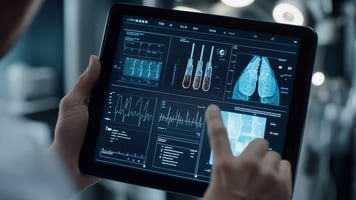2023 has been a phenomenal year for artificial intelligence (AI), yet we’re only halfway through....
As Artificial Intelligence (AI) takes prominence in the headlines and people begin to uncover the full scope of its capabilities, we are starting to see how it’s revolutionizing the field of medicine.
With the intersection of AI and medicine, innovative solutions are emerging at unprecedented rates – transforming healthcare delivery and patient outcomes.
From AI-powered diagnostics to precision medicine and drug discovery; in the wake of understanding just how powerful AI is, we are only scratching at the surface of what may be to come.
So, what advancements and progressions are we currently seeing? Join us as we delve into the transformative potential of AI in the ever-evolving landscape of medicine.
Understanding AI in Medicine
Although the recognition of AI in everyday life may seem relatively new, the concept of Artificial Intelligence has been around for many decades.
Before Chat-GPT, Siri, and the Techspert AI algorithm, the history of AI can be dated all the way back to when the term ‘Artificial Intelligence’ was first coined at Dartmouth College in 1955.
However, it wasn’t until the 1970s that AI broke through into the healthcare sector, with researchers developing a ground-breaking AI program called MYCIN to assist in identifying treatments for blood infections.
The decades that followed showed AI generating a standing in many ways within healthcare, including:
- Aiding in precise surgical procedures
- Managing data collection and handling
- Drug discovery
- Speed of medical diagnosis
- Transforming patient experiences
Many of the limitations set for AI before the 2000s have since been overcome as we begin to understand more about its usage. With the recent advancements in AI technology, we have ushered in a new era in medicine.
AI systems can now analyze complex algorithms and self-learn, allowing for the application of AI in clinical practice. These systems can improve diagnostic accuracy, workflow efficiency, and risk assessment models.
As scientists witness an unprecedented rate of progress in algorithms and programs, we are gaining insights into what this could mean for the future of AI in medicine.
Advancements in AI Technology
Deep learning has revolutionized AI by emulating the way humans learn. Researchers are leveraging the latest advancements in deep learning within the field of AI to enhance their efforts across numerous research projects.
Here are a few examples of how scientists and researchers are currently using AI in the medical field:
- Scientists from McMaster University and the Massachusetts Institute of Technology have trained AI to discover a new antibiotic that can kill one of the world’s deadliest superbugs. The AI analyzed 6,680 compounds within an hour and a half before revealing abaucin as the antibiotic of choice.
- Researchers have developed an AI tool that can predict Parkinson’s disease up to 15 years before the onset of symptoms with 96% accuracy from blood samples.
- The LIBRA study led by researchers from The Royal Marsden in collaboration with the Institute of Cancer Research and Imperial College has developed an AI algorithm to identify cancerous nodules in the lungs.
- A Mayo Clinic study used AI to assist with a new screening tool in cardiovascular medicine for left ventricular dysfunction in asymptomatic individuals. The results indicated a 93% accuracy in AI left ventricular dysfunction, higher than the 85% accuracy of mammograms.
The scope of AI in the medical field is enormous, with various other research projects underway which could change the landscape of biomedical science as we know it.
As AI continues to evolve and reveal unforeseen capabilities through various studies and cases, the healthcare industry is poised for promising advancements.
Throughout all these studies, the focus of using AI in healthcare is centered around enhancing patient experiences, outcomes, and diagnoses. AI algorithms can sift through large datasets, identify patterns, and extract valuable insights that may not be readily apparent to human researchers. This enhanced data processing capability enables scientists to make more informed decisions, discover new associations, and gain deeper insights into diseases and treatments.
By leveraging AI in medicine, scientists can accelerate research timelines, improve diagnostic accuracy, optimize treatment strategies, and ultimately enhance the overall understanding of complex medical phenomena.
While the advancements in AI have opened incredible possibilities in the field of medicine, it is important to acknowledge that even this revolutionary technology comes with its own set of limitations and potential drawbacks. As the world begins to welcome the notion of AI, ethical considerations of AI in medicine must be made. What are these limitations comprised of, and what does this mean for the future of AI in medicine?
The Outlook of AI in Healthcare Innovation
AI may not be hindered in its capabilities like it was in the 20th century, but the birth of self-learning from language models and algorithms doesn’t come without some form of limitation.
AI-based systems raise concerns regarding data security and privacy. Because health records are vital and vulnerable, hackers often target them during data breaches. Therefore, maintaining the confidentiality of medical records is crucial. Understanding AI compliance is a new concept for many industries, which is why it’s crucial to grasp a good understanding of it.
Although AI is showing promising developments, each study comes with its own need for validation and testing, so AI being the be-all and end-all of medicine isn’t quite the case just yet. Many studies using AI rely on ‘ideal data’, which may not reflect real-world scenarios with unknown outcomes, highlighting the need for further assessment.
As AI continues to take off and learn more by the second, we never say never in what it may become capable of handling in the future. It is vital to remember, however, AI is here to support doctors, not replace them. The power humans still have over machines is the ability to empathize and show compassion, which is at the heart of the patient experience. For now, we will use AI to the best of its abilities and wait to see what hope it may bring to the future of medicine. One thing is for sure, however; the landscape of medical discovery and innovation is shifting in the right direction.
Join us at the Forefront of AI
For those that don’t know about Techspert already, we were founded in 2016 as a response to the difficulties faced trying to connect with the right experts at the right time to inform commercial decisions. Our unique AI algorithm was developed to meet this need and, as a result, source the right experts quicker than anywhere else.
Ready to test the revolutionary capabilities of AI for your business? Get in touch to see how we can help.






